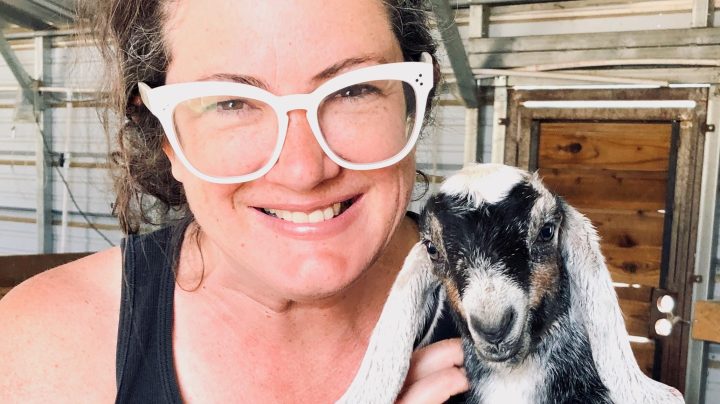
How a California goat ranch is recovering from the pandemic and wildfire
How a California goat ranch is recovering from the pandemic and wildfire

“My Economy” tells the story of the new economic normal through the eyes of people trying to make it, because we know the only numbers that really matter are the ones in your economy.
Even before the pandemic, physicist Gloria Putnam worked from home for her job managing a Chinese semiconductor company’s North American business. For Putnam, home is a goat ranch called Angeles Crest Creamery in the Angeles National Forest in Valyermo, California.
Because Angeles Crest Creamery is small, Putnam said it’s not a profitable food business. The mission of the farm is to demonstrate sustainable agriculture that doesn’t require imported water, so the goats forage the land for food. The business’ income comes through agritourism; Putnam and her boyfriend rent out Airbnbs on the property and host educational events.

“Our business was already closed starting in March because of the pandemic,” Putnam said. “Then the Bobcat Fire came through here on September 19.”
Putnam and her partner evacuated their goats, pigs, dogs and horse the day before the fire. From their evacuation camp, they could see the fire hitting their ranch.

“Now with the fire, we’ve also lost our free food source,” Putnam said. “Now we have to buy alfalfa hay that we bring in, and it costs about $4,000 a month to keep the goats fed.”
Not only is that expensive, especially since the ranch has no income while its Airbnb rentals are closed, but it’s also counter to the ranch’s sustainability goal. The hay they buy is grown in the desert by pumping groundwater.
Putnam set up a hay fund, and the donations they received allowed them to feed the goats without worrying in the weeks following the fire. She recently created a newsletter documenting the ranch’s recovery from the fire and is asking subscribers to donate to cover the cost of hay.
“The fire has been a pretty traumatic event for us,” Putnam said. “It’s definitely challenged us in a way that we didn’t anticipate, both financially but also just emotionally. We feel kind of exhausted and tired. And we have to at this moment try and solve all these really complicated problems. One of the reasons that the hay fund has been so important is it gives us a little bit of time to recover ourselves while we think through these complicated problems.”
Let us know how your economy is doing using the form below, and your story may be featured on a future edition of “My Economy.”
There’s a lot happening in the world. Through it all, Marketplace is here for you.
You rely on Marketplace to break down the world’s events and tell you how it affects you in a fact-based, approachable way. We rely on your financial support to keep making that possible.
Your donation today powers the independent journalism that you rely on. For just $5/month, you can help sustain Marketplace so we can keep reporting on the things that matter to you.












